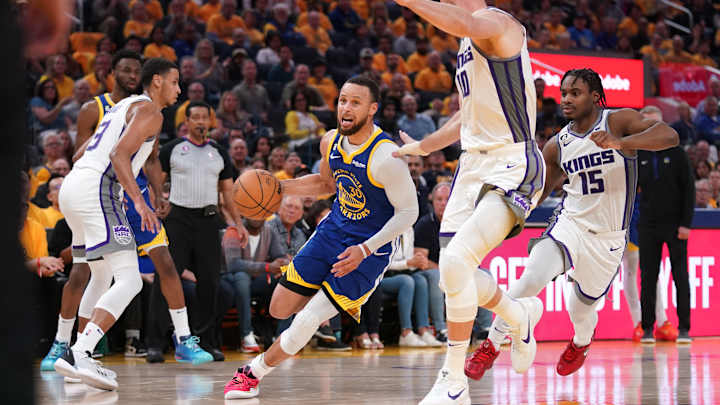Game 7 Clash Between Warriors-Kings Will Come Down to Three Crucial Factors

After three consecutive wins, and with a chance to close out their first-round series at home against the Kings, it would have been fair to expect the defending-champion Warriors to take a businesslike approach in eliminating Sacramento in Game 6 on Friday night.
The reality turned out to be much different than many people’s expectations, though.
With the Kings’ surprisingly breezy 118-99 victory at Golden State, Sacramento punched its way to a winner-take-all Game 7 on Sunday afternoon. The result puts the Warriors’ backs against the wall, not only because they were absolutely terrible on the road this season—Game 7 will be in Sacramento, in front of what figures to be a raucous crowd—but also because a loss would mark the first time the trio of Stephen Curry, Klay Thompson and Draymond Green were defeated in a series prior to the NBA Finals round. And that would prompt fair questions about whether the club’s dynastic run is effectively over.
Ahead of what is expected to be one of the most-watched games in recent memory, here are the three most important things to keep a close eye on during Sunday’s matchup.

Mike Brown’s offense-heavy lineup
Perhaps the most interesting string that the recently named Coach of the Year pulled Friday was leaning into Sacramento’s historically elite offense as opposed to committing more to the defense in an effort to slow down the Warriors.
It was a counterintuitive move, certainly, but stop and think about that for a moment: why, exactly, would one of the fastest clubs in the NBA—which has perhaps the fastest player in the NBA—want to slow things down against an older team that’s the worst in the league at taking care of the ball?
Brown seemed to be raising that very question in Game 6, cutting back minutes for backup guard Davion Mitchell and backup big Alex Len—players with defensive reputations—while increasing playing time for guard Terence Davis and small ball five Trey Lyles. Along with extended minutes for Kevin Huerter and rookie Keegan Murray, Sacramento’s rotations enjoyed more spacing, which meant more open looks from deep stemming from drive-and-kick chances. It also meant making the Warriors run farther to close out on shooters.
The Kings, at times running the Dubs in circles, knocked down a series-high 17 triples. The higher tempo made the club less reliant on All-Star center Domantas Sabonis, who generally serves as the offense’s dribble-handoff hub, but hasn’t played well for much of the series.
How long a leash will Poole have if he keeps struggling?
Speaking of guys who haven’t played well, it’s hard to ignore Poole’s struggles, which have been brutal. He’s shot just 33.8% in this series—and 24% from three—including a frigid 2-for-11 showing in Game 6. Perhaps the strangest moment: on a long-rebound opportunity, Poole raced toward the top of the key to grab a loose ball, but then lost control after looking like he’d secured it two or three different times. He stumbled out of bounds, 25 feet from where he’d started, and as a result, the ball went back to the Kings, who’d done nothing to earn it, aside from watching a sequence that seems destined for Shaqtin’ a Fool.
In light of Poole’s offensive struggles, coach Steve Kerr will have to figure out early how long a leash he wants to give the young guard in a deciding game. He’s been starting Poole ever since Green’s suspension in Game 3, explaining that the team’s spacing is better with him than it would be with a non-shooting Green next to center Kevon Looney. But it’s also true that the team’s defense is weaker—both in the halfcourt and in transition—with Poole involved.
So if Poole simply doesn’t have it offensively, it would make more sense for Kerr to have a quick hook by going to Green, Gary Payton II or even second-year wing Moses Moody.
One day of rest, and the Warriors playing on the road
Following Game 6, Sacramento sixth man Malik Monk was blunt about one of the biggest adjustments the Kings made with Brown’s smaller, punchier lineups.
“We talked about starting strong, starting early, and running on them. Because we knew we had one day [off]. Last couple games, they had a two-day break,” Monk said. “We knew we could run on them, and we took advantage of that. … They was a little tired. We’re a little younger than they are.”
To Monk’s point about running whenever possible—even after Golden State baskets—Game 6 was the fastest of the series so far, with each team logging 108 possessions. A number of times, including the very first possession of the second half, the Kings raced the ball up the floor before the Warriors were set on defense. As such, the less-experienced Sacramento club logged twice as many fastbreak points, winning that battle 18-9.
For context, the Kings were 32-17 during the regular season when playing on just one day of rest, the league’s fourth-best mark. By contrast, the Warriors were 25-23. Sunday’s Game 7, too, will feature just one day of rest, with slightly fewer hours between games than what the teams had before Game 6, even.
But for all the numbers—the pace, the rest days, and so on—the one that figures to be talked about most is the Golden State’s atrocious 11-30 mark on the road during the regular season; a record that doesn’t exactly scream potential NBA champion, despite the core’s four prior rings.
Still, Game 7 comes down survive and advance. And if the Warriors can knock out their neighbors to the northeast and win another on the road, it will go a long way in arguing that they might still have championship fuel left in their dynastic tank.
